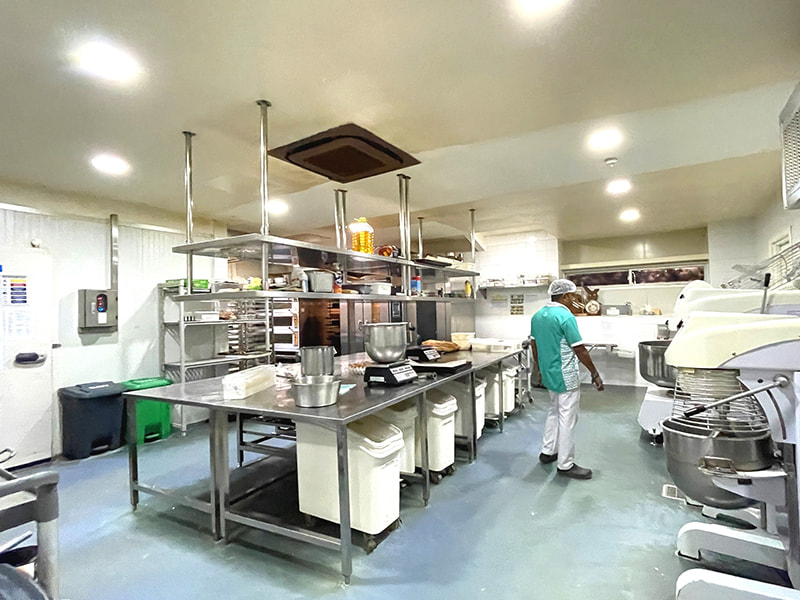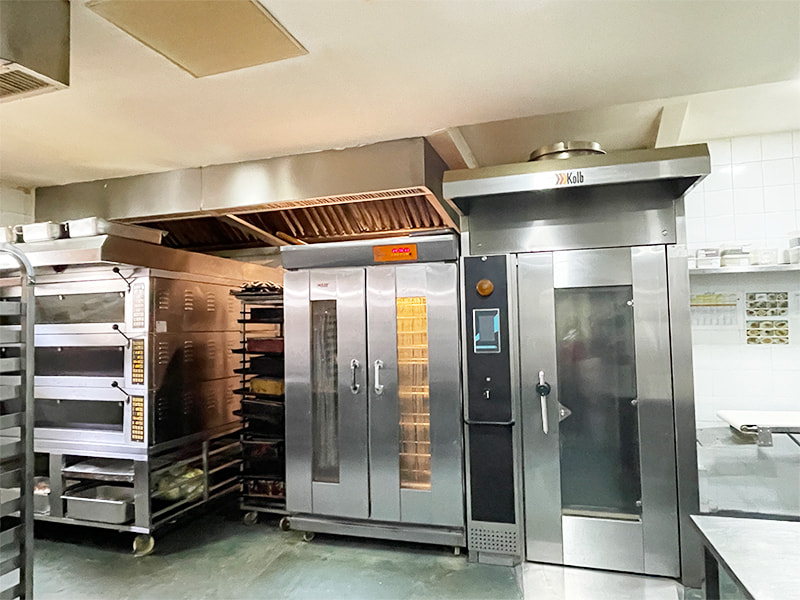Having the right equipment is crucial for the success of any restaurant. The equipment used in a restaurant kitchen plays a vital role in the daily operations and overall efficiency of the establishment. It not only helps in the preparation and cooking of food but also ensures the safety and quality of the dishes served.
Investing in high-quality restaurant equipment is essential to ensure that the kitchen can handle the demands of a busy restaurant. Whether it's ovens, ranges, refrigerators, or food processors, each piece of equipment serves a specific purpose and contributes to the smooth functioning of the kitchen.
The quality of the equipment is of utmost importance. Investing in reliable and durable equipment will save money in the long run as it will last longer and require less frequent repairs or replacements. It is also essential to consider the specific needs of the restaurant and choose equipment that is suitable for the type of cuisine and menu being offered.
Properly functioning equipment not only ensures that food is cooked and prepared correctly but also contributes to the safety and hygiene of the kitchen. Regular maintenance and cleaning of the equipment are necessary to prevent the growth of bacteria and ensure food safety.
In addition to functionality and quality, restaurant owners should also consider the space available in the kitchen and the budget allocated for equipment purchases. It is important to carefully plan the layout of the kitchen and choose equipment that fits within the available space.
Overall, investing in the right restaurant equipment is a crucial step in setting up a successful restaurant. It not only enhances the efficiency of the kitchen but also contributes to the overall dining experience for customers. By prioritizing the importance of restaurant equipment, owners can create a well-equipped kitchen that meets the needs of their establishment.

Setting up a commercial kitchen, having the right equipment is essential for smooth operations and efficient food preparation. Here are some of the key pieces of equipment that every restaurant kitchen should have:
Ovens: Commercial ovens are designed for high-volume cooking and can come in various types, including convection ovens, combination ovens, pizza ovens, and conveyor ovens. Choose an oven that suits your specific cooking needs.
Ranges and ventilation: Gas ranges provide precise temperature control, while electric ranges offer even cooking. Proper ventilation is also crucial for maintaining air quality and temperature in the kitchen.
Food processors: Food processors are versatile tools that can chop, slice, blend, and puree ingredients. Consider batch bowl processors, continuous feed food processors, or buffalo choppers depending on your kitchen's needs.
Mixers: Commercial mixers are essential for bakeries and restaurants that need to mix large quantities of dough or batter. Hand mixers, countertop mixers, and floor mixers are available depending on your volume of mixing.
Slicers: Slicers are useful for delis and restaurants that need to slice meats, cheeses, and produce. Choose a slicer based on the volume and type of slicing you'll be doing.
Freezers and refrigerators: Proper refrigeration is crucial for food safety. Invest in high-quality freezers and refrigerators to store ingredients and prepared foods at the correct temperature.
Safety equipment: Fire extinguishers, first aid kits, and rubber floor mats are essential for maintaining a safe kitchen environment.
Storage racks and shelving: Organize your kitchen with sturdy storage racks and shelving to keep utensils, ingredients, and equipment easily accessible.
Consider your kitchen's layout, available space, and budget when purchasing equipment. Quality and durability are also important factors to ensure that your equipment can withstand the demands of a commercial kitchen. By investing in the right equipment, you can set your restaurant up for success and efficient operations.
These considerations will help ensure that you choose the right equipment for your specific needs and budget.
Quality: Quality is paramount when it comes to restaurant equipment. You want to invest in high-quality items that will withstand the rigors of a commercial kitchen and last for years to come. Look for reputable manufacturers and consider whether you want to buy new or used equipment. Inspect the equipment in person to check for any flaws or damage before making a purchase.
Space: Before purchasing equipment, carefully consider the layout and available space in your kitchen. Measure the dimensions of each piece of equipment to ensure that it will fit through the doors and into your kitchen. It's important to have an efficient layout that allows for easy movement and workflow without overcrowding.
Price: Price is a crucial factor when buying restaurant equipment. Determine which pieces of equipment are essential for your kitchen and prioritize investing in high-quality items for those. Look for ways to save money, such as buying multipurpose equipment or purchasing used equipment. However, be sure to thoroughly inspect used equipment and consider factors such as age, condition, and warranty.
Ease of use and cleaning: Consider how easy the equipment will be to use and clean on a daily basis. Look for equipment that is ergonomic and has user-friendly features. Review the cleaning instructions for each piece of equipment to ensure that it can be effectively cleaned and maintained. Stainless steel equipment is often easier to clean and reduces the risk of harboring bacteria.
Choosing the right supplier: Selecting a reputable restaurant equipment supplier is crucial to ensure that you receive high-quality equipment and reliable service. Look for suppliers who offer a wide range of equipment options and have a good reputation in the industry. Consider factors such as installation assistance, maintenance and repair services, and customer support.Introducing INEO China, your one-stop hotel kitchen equipment manufacturer! As a global leader in commercial kitchen solutions, we specialize in providing top-notch equipment for hotels, resorts, catering services, and central kitchens. Our expertise extends to offering comprehensive A to Z solutions.With the right equipment, your restaurant will be well-equipped to meet the demands of your customers and provide exceptional culinary experiences.

When it comes to purchasing restaurant equipment, there are several options available to ensure you find the best equipment for your needs. Consider the following options when looking to buy restaurant equipment:
Local restaurant supply stores: These stores offer a wide range of kitchen equipment and supplies. The advantage of shopping at a local store is that you can see the equipment in person and get advice from knowledgeable staff. You may also find competitive prices and the ability to negotiate deals.
Online stores: Online retailers such as Webstaurant Store and RestaurantSupply offer a vast selection of restaurant equipment. Shopping online allows you to compare prices and read reviews from other customers. However, be sure to factor in shipping costs and delivery times when making your decision.
Secondhand marketplaces: If you're on a tight budget, consider purchasing used restaurant equipment. Websites like Craigslist and Facebook Marketplace often have listings for used equipment at lower prices. Just be sure to thoroughly inspect the equipment before purchasing and negotiate a fair price.
Auctions and liquidation sales: Keep an eye out for auctions and liquidation sales in your area. These events can offer significant discounts on both new and used equipment. However, be prepared to act quickly and bring cash or a credit card for immediate payment.
Equipment leasing: If purchasing equipment upfront is not financially feasible, consider leasing. Leasing allows you to spread out the cost of equipment over time, making it more manageable for your budget. Be sure to carefully review the terms and conditions of the lease agreement before committing.
Remember to prioritize quality, durability, and functionality when purchasing restaurant equipment. Consider your specific needs and budget, and don't hesitate to consult with industry experts or fellow restaurant owners for recommendations. By choosing the right suppliers and equipment, you can set your restaurant up for success.
Purchasing restaurant equipment can be a significant investment for any new or existing establishment. However, the upfront costs of buying equipment outright can be a strain on your budget. Fortunately, there are several financing options available to help you acquire the necessary equipment without breaking the bank.
Equipment Leasing: Leasing allows you to obtain the equipment you need while making monthly payments over a set period of time. This option is particularly beneficial for startups or businesses with limited capital. Leasing also provides flexibility, as you can upgrade your equipment at the end of the lease term.
Equipment Financing: Similar to leasing, equipment financing allows you to spread out the cost of your equipment over time. However, with financing, you will own the equipment at the end of the payment term. This option is ideal for businesses that plan to use the equipment for a long period of time.
Small Business Loans: If you prefer to own your equipment outright, a small business loan can provide the necessary funds. These loans are typically offered by banks or other financial institutions and can be used for various business expenses, including equipment purchases. It's important to compare interest rates and repayment terms to ensure you choose the best loan option for your needs.
Equipment Rental: If you only need certain equipment for a short period of time or for a specific event, renting may be a cost-effective option. Renting allows you to access high-quality equipment without the long-term commitment or upfront costs associated with purchasing.
When considering financing options, it's essential to assess your business's financial situation and future goals. Carefully review the terms and conditions of each option, including interest rates, repayment schedules, and any additional fees. Additionally, consult with a financial advisor or accountant to determine the best financing solution for your specific needs.
Remember, investing in high-quality equipment is crucial for the success of your restaurant. By exploring financing options, you can acquire the necessary equipment while maintaining financial stability and ensuring the long-term growth of your business.
Proper maintenance and care of restaurant equipment is essential for the longevity and efficiency of your kitchen operations. Regular maintenance not only extends the lifespan of your equipment but also ensures that it operates at its best, reducing the risk of breakdowns and costly repairs. Here are some tips for maintaining and caring for your restaurant equipment:
Cleaning: Regularly clean and sanitize your equipment to prevent the buildup of grease, food particles, and bacteria. Use appropriate cleaning products and follow the manufacturer's instructions. Pay special attention to areas that are prone to dirt and grime, such as grills, ovens, and fryers.
Inspections: Conduct regular inspections of your equipment to identify any signs of wear and tear or potential issues. Check for loose screws, damaged cords, or malfunctioning parts. Address any problems immediately to prevent further damage and ensure the safety of your staff.
Lubrication: Some equipment may require regular lubrication to keep moving parts functioning smoothly. Consult the manufacturer's guidelines for the recommended lubricants and frequency of lubrication.
Calibration: Certain equipment, such as ovens and thermometers, may need to be calibrated periodically to ensure accurate temperature readings. Follow the manufacturer's instructions for calibration or seek professional assistance if needed.
Training: Properly train your staff on the correct operation and maintenance of the equipment. This includes teaching them how to use the equipment safely, clean it effectively, and report any issues or malfunctions promptly.
Scheduled Maintenance: Create a maintenance schedule to keep track of routine tasks such as filter replacements, deep cleanings, and equipment inspections. Regularly servicing your equipment can help prevent unexpected breakdowns and ensure its optimal performance.
Remember, investing time and effort into the maintenance and care of your restaurant equipment will pay off in the long run. It will not only save you money on repairs and replacements but also contribute to a safe and efficient kitchen environment.
Keywords:
Originally published 16 Sep 2025, updated 16 Sep 2025.
Get a Project Quote
Our representative will contact you soon